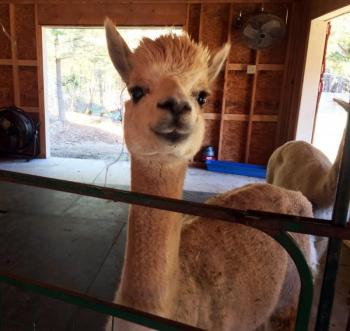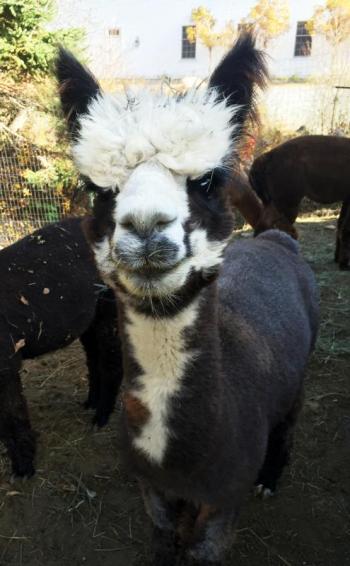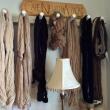The next time you make the trip to Southport Memorial Library take a little extra time and go next door. You'll be greeted by something that wouldn't look out-of-place in a Dr. Seuss book.
Seventeen alpacas live next door to the library at the Cape Newagen Farm where they, and their owners, welcome visitors to come see what a working alpaca farm is all about.
Anne Gobes and Michael Ciccarelli have been coming to Southport from the Hartford, Conn. area, where Gobes was a school administrator since 2002. In 2004, the couple, along with their three children and two dogs, bought the property next to the library on Southport.
They have owned alpacas since 2011, and brought them here when Gobes retired in June 2015. Thus began a new life's journey. Where before there were school and students, now there are 17 alpacas – six boys and 11 girls – occupying Gobes’ time.
“We chose to raise alpacas because of their friendly, environmental nature,” Gobes said. “They are kind and gentle. Their manure is rich in nitrogen, making it great for gardeners, and when they chew down the grass, they have a split lip and no upper front teeth, so they nibble, not pulling up the root, so the grass grows back.”
And then there's the fiber.
“I'm a knitter, and I'd buy yarn in every yarn shop I went into,” Gobes said. “When we thought about starting an alpaca farm, I said, 'Okay, let's think about how I can use what we do, and make my own yarn.'”
The alpacas are sheared once a year. Their soft, silky-feeling fiber contains no lanolin, making it easy to wash with dish detergent and water. After washing and drying it, Gobes goes on to “card,” or comb it, and then spin the yarn. After it has been spun, it is then either sold or used for one of her creative designs, including scarves, sweaters and rugs.
There is hand-spun and mill-spun yarn of several different colors for sale. The Cape Newagen alpacas provide around 15 different colors with various shades, so no dying is required for yarn, thus making the process more environmentally friendly. Colors include grays, blacks, fawns, and maroons.
The girls and boys are kept in separate spaces, each with their own fenced-in areas and stables. The alpacas have three fenced-in acres to roam about.
“They don't require a lot of space,” Gobes said. “As long as they're being fed and getting water, they're happy.”
It's hard to not reach out and hug the alpacas, with their big expressive eyes and soft-as-silk coats, but Gobes said alpacas don't like being petted. “They like your company, but they're not like goats where they follow you around looking for attention.”
The alpacas act curious when a visitor approaches, but are wary if approached quickly. During an interview with Gobes, an item was placed on a plastic barrel near the alpacas. The whole herd, which had been gathered around the interview, scattered.
The gestation period for alpacas is 11 to 12 months. One of them, Caliente, is due to have a baby, or cria, on Nov. 21. Typically they only have one, but they have been known to have twins, according to Gobes.
Contrary to popular belief, alpacas don't spit at people. “They'll spit at each other,” Gobes said. “It's their way of communication when they're unhappy, or telling each other to 'back off, this is my food.'”
There will be an open house at the farm from 1 to 3 p.m. on Sunday, Nov. 15. You can see carding, spinning and peg loom demonstrations and there will be mill-spun and hand-spun yarns, as well as alpaca socks for sale. On Nov. 18, there will be an “open knit” where you can bring a knitting project or just join the knitters for a cup of tea. Or just go to visit with the boys and girls.
It's easy to lose track of time when you're at Cape Newagen Farm. The sweet, quiet serenity of the alpacas draws you in, and it's hard to walk away.
“I love getting up and coming to work in the morning,” Gobes said.
Visit the Cape Newagen Farm website at www.capenewagenfarm.com or call 207-633-0416, 860-508-5714 or 860-918-0416 for more information.

































